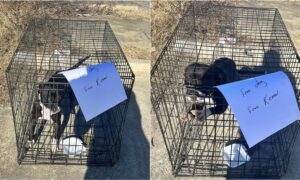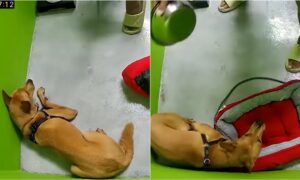“This post contains affiliate links, and I will be compensated if you make a purchase after clicking on my links.”
Is your fur baby stinking up the house with his doggie poots? If you’ve had a dog for any length of time, you’re definitely familiar with the problem! Just like us, gas and flatulence can be experienced by our canine buddies. It can be a bit disturbing, stinky, and unpleasant to them and to us, even if the gas formation is only a natural result of some digestive process or effect. In this article, we will give you four different causes of dog gas, how they are formed and how to treat each one and also to prevent it from happening, or at least lessen its frequency of occurrence.
Certain breeds, especially Boxers, are world famous for doggie poots. The main point for you to keep in mind about whether or not your dog has a serious problem is explained in this article on Pets.WebMD.com:
A sudden bout of flatulence, accompanied by abdominal discomfort, loss of appetite, or diarrhea, is an indication to seek veterinary attention.
The key here is, is your dog having a “sudden bout”, along with other symptoms?
Causes and Cures for Doggie Poots
- Too much fermentation of bacteria – just like humans, there are some dogs with stomachs that can only properly digest certain foods, but not other kinds of foods. There are some substances in their diet that cannot be digested well; for example, soy products, lactose, peas, beans and related foods cannot be easily digested by adult dogs. Also, there are some foods that can potentially cause flatulence, such as wheat, oat bran, and other foods rich in fermentable fiber. The solution to this is to simply give your dog some foods which are lower in fiber. You can also try feeding him enzymes, if the flatulence is quite often and much more extreme than normal. Enzymes come in tablet or powder form and help your dog in adjusting his digestive problems and abnormalities. They are added as a supplement to your dog’s food and can be bought from many pet stores.
- Aerophagia or excessive swallowing of air– this happens when your dog eats too hastily and munches large bites of food. Air comes along with the gulping down of the food and eventually enters your dog’s digestive system and passes as gas. If this occurs, try lessening and balancing your dog’s mealtime intervals, by not allowing him to eat too much or too little. Keep his diet regular, by feeding him more frequent meals, but in small amounts. Dogs also tend to compete with each other when they eat together, so to avoid the excessive gulping, they should eat in separate places. (The dangerous condition known as “bloating” is also more likely to occur when eating too fast or gulping down too much food too soon after physical activity. Wait for an hour to keep him from gulping food down.)
- Changes in diet – this occurs when your dog is introduced to a new diet or a new set of foods. Often times, his stomach is not completely ready for the change which can lead to digestive upsets which in turn leads to doggie poots. To avoid this, you should introduce a new food or diet to your dog slowly and gradually, beginning in small amounts, and gradually adding until your dog gets used to it.
- Gastrointestinal diseases – if none of the above seem to be helping the matter, the cause might actually be due to a disease in his digestive system, and you might want to discuss it with your vet and see if he or she thinks it’s worth an office visit. There can be pain that your dog might be experiencing, and depending on what your vet diagnoses, your dog could have internal parasites, inflammatory bowel disease, irritable bowel syndrome, gastrointestinal neoplasia, small intestinal bacterial growth, and many others. It would probably be wise to get your vet to check your buddy out when nothing else is working.
The above are the most common reasons and common sense cures for doggie poots. A little gas now and then is normal, so you usually don’t need to pay much attention unless it’s a big, continuous problem.
Have you had a dog with this problem? How did you cure it? Please share below.













Ron Miller
Jan 15, 2013 at 3:05 pm
Patti and Jennifer: thanks for your insights, and for sharing exactly what worked for you. That should be helpful to others.
Jennifer Haviland
Jan 3, 2013 at 6:40 pm
I have a wonderful german shorthaired pointer who has the most sensitive doggie system ever. Just like Patti we had to do a ton of trial and error. We had to do food trials for around 3 years of her life and now we can only feed her this one type of food, it’s blue buffalo salmon recipe. She can only eat foods that have no grains. So if we get treats we have to make sure to check the ingredients… NO people food ever, that caused the worst stench… poor baby…. anyways she is a shiny happy doggy now at her young 6 years old.
Patti
Jan 3, 2013 at 9:00 am
I have a sweet goldie who has a terribly sensitive stomach and digestive system. It took a lot of trial and error, but I now have her on food and a digestive food supplement that literally prevents any flatulance and insures firm stools, shiny coat and good breath. If you’re willing to put the time and money into your babies, you can get excellent results, just the way you’d do with your fleshy children if they had issues with digestion.
In case anyone is wondering what I found that works, I’m happy to share. I feed her only grain free food. She gets Blue Buffalo grain free dry dog food called “Freedom” and Merrick grain free canned food “Turducken” mixed in which she LOVES! I also add a half teaspoon of a product called Superfood Digestion for dogs. It’s a powder to aid in digestion for dogs that have issues with that.
Rosalie
Oct 18, 2012 at 12:08 pm
thanks for the advise on the doggie poots I have a boxer and she poots once in a while but reading your advice was very helpful-thanks